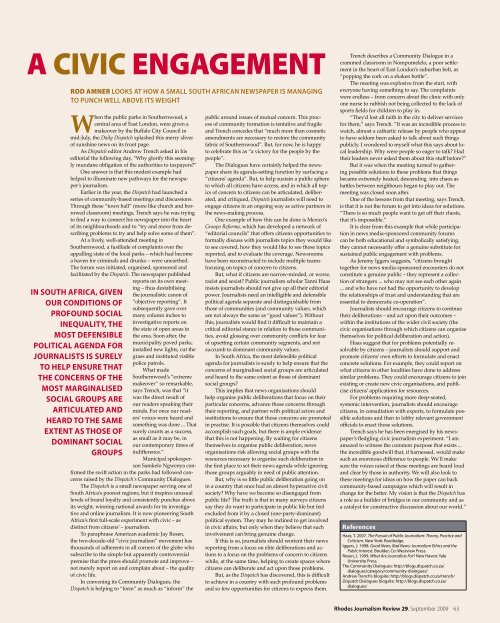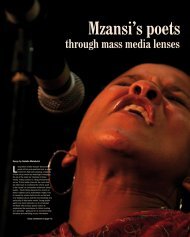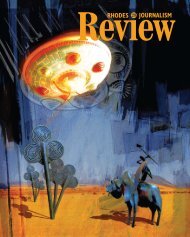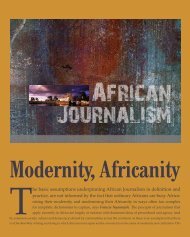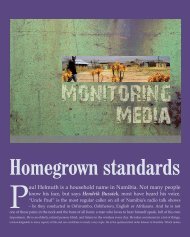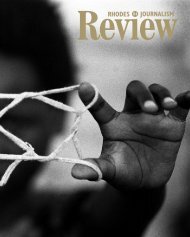Riding on the cup: - Rhodes Journalism Review - Rhodes University
Riding on the cup: - Rhodes Journalism Review - Rhodes University
Riding on the cup: - Rhodes Journalism Review - Rhodes University
You also want an ePaper? Increase the reach of your titles
YUMPU automatically turns print PDFs into web optimized ePapers that Google loves.
a civic enGaGemenT<br />
rod amner lOOkS AT HOW A SmAll SOUTH AFRICAN NEWSPAPER IS mANAgINg<br />
TO PUNCH WEll ABOvE ITS WEIgHT<br />
When <strong>the</strong> public parks in Sou<strong>the</strong>rnwood, a<br />
central area of East L<strong>on</strong>d<strong>on</strong>, were given a<br />
makeover by <strong>the</strong> Buffalo City Council in<br />
mid-July, <strong>the</strong> Daily Dispatch splashed this merry sliver<br />
of sunshine news <strong>on</strong> its fr<strong>on</strong>t page.<br />
As Dispatch editor Andrew Trench asked in his<br />
editorial <strong>the</strong> following day, “Why glorify this seemingly<br />
mundane obligati<strong>on</strong> of <strong>the</strong> authorities to taxpayers?”<br />
One answer is that this modest example had<br />
helped to illuminate new pathways for <strong>the</strong> newspaper’s<br />
journalism.<br />
Earlier in <strong>the</strong> year, <strong>the</strong> Dispatch had launched a<br />
series of community-based meetings and discussi<strong>on</strong>s.<br />
Through <strong>the</strong>se “town hall” (more like church and borrowed<br />
classroom) meetings, Trench says he was trying<br />
to find a way to c<strong>on</strong>nect his newspaper into <strong>the</strong> heart<br />
of its neighbourhoods and to “try and move from describing<br />
problems to try and help solve some of <strong>the</strong>m”.<br />
At a lively, well-attended meeting in<br />
Sou<strong>the</strong>rnwood, a fusillade of complaints over <strong>the</strong><br />
appalling state of <strong>the</strong> local parks – which had become<br />
a haven for criminals and drunks – were unear<strong>the</strong>d.<br />
The forum was initiated, organised, sp<strong>on</strong>sored and<br />
facilitated by <strong>the</strong> Dispatch. The newspaper published<br />
reports <strong>on</strong> its own meet-<br />
in souTh afriCa, given<br />
our C<strong>on</strong>diTi<strong>on</strong>s of<br />
Profound soCial<br />
inequaliTy, The<br />
mosT defensiBle<br />
PoliTiCal agenda for<br />
JournalisTs is surely<br />
To helP ensure ThaT<br />
The C<strong>on</strong>Cerns of The<br />
mosT marginalised<br />
soCial grouPs are<br />
arTiCulaTed and<br />
heard To The same<br />
exTenT as Those of<br />
dominanT soCial<br />
grouPs<br />
ing – thus destabilising<br />
<strong>the</strong> journalistic can<strong>on</strong> of<br />
“objective reporting”. It<br />
subsequently gave over<br />
many column inches to<br />
investigative reports <strong>on</strong><br />
<strong>the</strong> state of open areas in<br />
<strong>the</strong> area. So<strong>on</strong> after, <strong>the</strong><br />
municipality paved parks,<br />
installed new lights, cut <strong>the</strong><br />
grass and instituted visible<br />
police patrols.<br />
What made<br />
Sou<strong>the</strong>rnwood’s “extreme<br />
makeover” so remarkable,<br />
says Trench, was that “it<br />
was <strong>the</strong> direct result of<br />
our readers speaking <strong>the</strong>ir<br />
minds. For <strong>on</strong>ce our readers’<br />
voices were heard and<br />
something was d<strong>on</strong>e ... That<br />
surely counts as a success,<br />
as small as it may be, in<br />
our c<strong>on</strong>temporary times of<br />
indifference.”<br />
Municipal spokespers<strong>on</strong><br />
Samkelo Ngwenya c<strong>on</strong>-<br />
firmed <strong>the</strong> swift acti<strong>on</strong> in <strong>the</strong> parks had followed c<strong>on</strong>cerns<br />
raised by <strong>the</strong> Dispatch’s Community Dialogues.<br />
The Dispatch is a small newspaper serving <strong>on</strong>e of<br />
South Africa’s poorest regi<strong>on</strong>s, but it inspires unusual<br />
levels of brand loyalty and c<strong>on</strong>sistently punches above<br />
its weight, winning nati<strong>on</strong>al awards for its investigative<br />
and <strong>on</strong>line journalism. It is now pi<strong>on</strong>eering South<br />
Africa’s first full-scale experiment with civic – as<br />
distinct from citizens’ – journalism.<br />
To paraphrase American academic Jay Rosen,<br />
<strong>the</strong> two-decade-old “civic journalism” movement has<br />
thousands of adherents in all corners of <strong>the</strong> globe who<br />
subscribe to <strong>the</strong> simple but apparently c<strong>on</strong>troversial<br />
premise that <strong>the</strong> press should promote and improve –<br />
not merely report <strong>on</strong> and complain about – <strong>the</strong> quality<br />
of civic life.<br />
In c<strong>on</strong>vening its Community Dialogues, <strong>the</strong><br />
Dispatch is helping to “form” as much as “inform” <strong>the</strong><br />
public around issues of mutual c<strong>on</strong>cern. This process<br />
of community formati<strong>on</strong> is tentative and fragile<br />
and Trench c<strong>on</strong>cedes that “much more than cosmetic<br />
amendments are necessary to restore <strong>the</strong> community<br />
fabric of Sou<strong>the</strong>rnwood”. But, for now, he is happy<br />
to celebrate this as “a victory for <strong>the</strong> people by <strong>the</strong><br />
people”.<br />
The Dialogues have certainly helped <strong>the</strong> newspaper<br />
share its agenda-setting functi<strong>on</strong> by surfacing a<br />
“citizens’ agenda”. But, to help sustain a public sphere<br />
to which all citizens have access, and in which all topics<br />
of c<strong>on</strong>cern to citizens can be articulated, deliberated,<br />
and critiqued, Dispatch journalists will need to<br />
engage citizens in an <strong>on</strong>going way as active partners in<br />
<strong>the</strong> news-making process.<br />
One example of how this can be d<strong>on</strong>e is Mexico’s<br />
Groupo Reforma, which has developed a network of<br />
“editorial councils” that offers citizens opportunities to<br />
formally discuss with journalists topics <strong>the</strong>y would like<br />
to see covered, how <strong>the</strong>y would like to see those topics<br />
reported, and to evaluate <strong>the</strong> coverage. Newsrooms<br />
have been rec<strong>on</strong>structed to include multiple teams<br />
focusing <strong>on</strong> topics of c<strong>on</strong>cern to citizens.<br />
But, what if citizens are narrow-minded, or worse,<br />
racist and sexist? Public journalism scholar Tanni Haas<br />
insists journalists should not give up all <strong>the</strong>ir editorial<br />
power. Journalists need an intelligible and defensible<br />
political agenda separate and distinguishable from<br />
those of communities (and community values, which<br />
are not always <strong>the</strong> same as “good values”). Without<br />
this, journalists would find it difficult to maintain a<br />
critical editorial stance in relati<strong>on</strong> to those communities,<br />
avoid glossing over community c<strong>on</strong>flicts for fear<br />
of upsetting certain community segments, and not<br />
succumb to dominant community values.<br />
In South Africa, <strong>the</strong> most defensible political<br />
agenda for journalists is surely to help ensure that <strong>the</strong><br />
c<strong>on</strong>cerns of marginalised social groups are articulated<br />
and heard to <strong>the</strong> same extent as those of dominant<br />
social groups?<br />
This implies that news organisati<strong>on</strong>s should<br />
help organise public deliberati<strong>on</strong>s that focus <strong>on</strong> <strong>the</strong>ir<br />
particular c<strong>on</strong>cerns, advance those c<strong>on</strong>cerns through<br />
<strong>the</strong>ir reporting, and partner with political actors and<br />
instituti<strong>on</strong>s to ensure that those c<strong>on</strong>cerns are promoted<br />
in practise. It is possible that citizens <strong>the</strong>mselves could<br />
accomplish such goals, but <strong>the</strong>re is ample evidence<br />
that this is not happening. By waiting for citizens<br />
<strong>the</strong>mselves to organise public deliberati<strong>on</strong>, news<br />
organisati<strong>on</strong>s risk allowing social groups with <strong>the</strong><br />
resources necessary to organise such deliberati<strong>on</strong> in<br />
<strong>the</strong> first place to set <strong>the</strong>ir news agenda while ignoring<br />
those groups arguably in need of public attenti<strong>on</strong>.<br />
But, why is so little public deliberati<strong>on</strong> going <strong>on</strong><br />
in a country that <strong>on</strong>ce had an almost hyperactive civil<br />
society? Why have we become so disengaged from<br />
public life? The truth is that in many surveys citizens<br />
say <strong>the</strong>y do want to participate in public life but feel<br />
excluded from it by a closed (<strong>on</strong>e-party-dominant)<br />
political system. They may be inclined to get involved<br />
in civic affairs, but <strong>on</strong>ly when <strong>the</strong>y believe that such<br />
involvement can bring genuine change.<br />
If this is so, journalists should reorient <strong>the</strong>ir news<br />
reporting from a focus <strong>on</strong> elite deliberati<strong>on</strong>s and acti<strong>on</strong>s<br />
to a focus <strong>on</strong> <strong>the</strong> problems of c<strong>on</strong>cern to citizens<br />
while, at <strong>the</strong> same time, helping to create spaces where<br />
citizens can deliberate and act up<strong>on</strong> those problems.<br />
But, as <strong>the</strong> Dispatch has discovered, this is difficult<br />
to achieve in a country with such profound problems<br />
and so few opportunities for citizens to express <strong>the</strong>m.<br />
Trench describes a Community Dialogue in a<br />
crammed classroom in Nompumelelo, a poor settlement<br />
in <strong>the</strong> heart of East L<strong>on</strong>d<strong>on</strong>’s suburban belt, as<br />
“popping <strong>the</strong> cork <strong>on</strong> a shaken bottle”.<br />
The meeting was explosive from <strong>the</strong> start, with<br />
every<strong>on</strong>e having something to say. The complaints<br />
were endless – from c<strong>on</strong>cern about <strong>the</strong> clinic with <strong>on</strong>ly<br />
<strong>on</strong>e nurse to rubbish not being collected to <strong>the</strong> lack of<br />
sports fields for children to play in.<br />
“They’d lost all faith in <strong>the</strong> city to deliver services<br />
for <strong>the</strong>m,” says Trench. ”It was an incredible process to<br />
watch, almost a cathartic release by people who appear<br />
to have seldom been asked to talk about such things<br />
publicly. I w<strong>on</strong>dered to myself what this says about local<br />
leadership. Why were people so eager to talk? Had<br />
<strong>the</strong>ir leaders never asked <strong>the</strong>m about this stuff before?”<br />
But it was when <strong>the</strong> meeting turned to ga<strong>the</strong>ring<br />
possible soluti<strong>on</strong>s to <strong>the</strong>se problems that things<br />
became extremely heated, descending into chaos as<br />
battles between neighbours began to play out. The<br />
meeting was closed so<strong>on</strong> after.<br />
One of <strong>the</strong> less<strong>on</strong>s from that meeting, says Trench,<br />
is that it is not <strong>the</strong> forum to get into ideas for soluti<strong>on</strong>s.<br />
“There is so much people want to get off <strong>the</strong>ir chests,<br />
that it’s impossible.”<br />
It is clear from this example that while participati<strong>on</strong><br />
in news media-sp<strong>on</strong>sored community forums<br />
can be both educati<strong>on</strong>al and symbolically satisfying,<br />
<strong>the</strong>y cannot necessarily offer a genuine substitute for<br />
sustained public engagement with problems.<br />
As Jeremy Iggers suggests, “citizens brought<br />
toge<strong>the</strong>r for news media-sp<strong>on</strong>sored encounters do not<br />
c<strong>on</strong>stitute a genuine public – <strong>the</strong>y represent a collecti<strong>on</strong><br />
of strangers ... who may not see each o<strong>the</strong>r again<br />
... and who have not had <strong>the</strong> opportunity to develop<br />
<strong>the</strong> relati<strong>on</strong>ships of trust and understanding that are<br />
essential to democratic co-operati<strong>on</strong>”.<br />
Journalists should encourage citizens to c<strong>on</strong>tinue<br />
<strong>the</strong>ir deliberati<strong>on</strong>s – and act up<strong>on</strong> <strong>the</strong>ir outcomes –<br />
within <strong>the</strong> instituti<strong>on</strong>s of <strong>the</strong> wider civil society (<strong>the</strong><br />
civic organisati<strong>on</strong>s through which citizens can organise<br />
<strong>the</strong>mselves for political deliberati<strong>on</strong> and acti<strong>on</strong>).<br />
Haas suggest that for problems potentially resolvable<br />
by citizens – journalists should support and<br />
promote citizens’ own efforts to formulate and enact<br />
c<strong>on</strong>crete soluti<strong>on</strong>s. For example, <strong>the</strong>y could report <strong>on</strong><br />
what citizens in o<strong>the</strong>r localities have d<strong>on</strong>e to address<br />
similar problems. They could encourage citizens to join<br />
existing or create new civic organisati<strong>on</strong>s, and publicise<br />
citizens’ applicati<strong>on</strong>s for resources.<br />
For problems requiring more deep-seated,<br />
systemic interventi<strong>on</strong>, journalists should encourage<br />
citizens, in c<strong>on</strong>sultati<strong>on</strong> with experts, to formulate possible<br />
soluti<strong>on</strong>s and <strong>the</strong>n to lobby relevant government<br />
officials to enact those soluti<strong>on</strong>s.<br />
Trench says he has been energised by his newspaper’s<br />
fledgling civic journalism experiment. “I am<br />
amazed to witness <strong>the</strong> comm<strong>on</strong> purpose that exists ...<br />
<strong>the</strong> incredible goodwill that, if harnessed, would make<br />
such an enormous difference to people. We’ll make<br />
sure <strong>the</strong> voices raised at <strong>the</strong>se meetings are heard loud<br />
and clear by those in authority. We will also look to<br />
<strong>the</strong>se meetings for ideas <strong>on</strong> how <strong>the</strong> paper can back<br />
community-based campaigns which will result in<br />
change for <strong>the</strong> better. My visi<strong>on</strong> is that <strong>the</strong> Dispatch has<br />
a role as a builder of bridges in our community and as<br />
a catalyst for c<strong>on</strong>structive discussi<strong>on</strong> about our world.”<br />
References<br />
Haas, T. 2007. The Pursuit of Public <strong>Journalism</strong>: Theory, Practice and<br />
Criticism. New York: Routledge.<br />
Iggers, J. 1998. Good News, Bad News: <strong>Journalism</strong> Ethics and <strong>the</strong><br />
Public Interest. Boulder, Co: Westview Press.<br />
Rosen, J. 1999. What Are Journalists For? New Haven: Yale<br />
<strong>University</strong> Press.<br />
The Community Dialogues: http://blogs.dispatch.co.za/<br />
dialogues/category/community-dialogues/<br />
Andrew Trench’s blogsite: http://blogs.dispatch.co.za/trench/<br />
Dispatch Dialogues blogsite: http://blogs.dispatch.co.za/<br />
dialogues/<br />
<strong>Rhodes</strong> <strong>Journalism</strong> <strong>Review</strong> 29, september 2009 63


